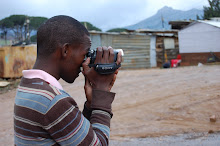This last week I invited my students to come to the center on Saturday and watch an Academy Award winning documentary “Born Into Brothels”. It’s an incredible documentary and if you haven’t seen it, I can’t recommend it highly enough. The doc is about 8 young children living in the red light district in India - and their lives are built around the profession of their mothers – prostitution. All of the young girls face the reality that once they are old enough they will also be forced into working “the line”.
An American woman that has been living in India for some time taking pictures, and she gives a camera to each child and begins to the children how to take pictures. The journey for each child is amazing.
There were several small breakthroughs as a result of this documentary. First, almost the entire class showed up to view it. I know this sounds like a silly thing to be grateful for, but it was not a requirement to show up. Also, understand that what I have been prepared for was a very high drop out rate. Some programs start here with 30 students and end with 3. It’s only been two weeks, but I’ve yet to lose one student.
Second, after watching the documentary several students asked me when this was made. At first I didn’t understand why they were asking this question, and I told them that it wasn’t that long ago, I think it won the award in 2001 or somewhere close. The reason they asked that question blew me away, they couldn’t believe that there were people living in these conditions right now. So here we have a group of students, a few of which are living in small brick homes, and most of whom are living in shacks. From the American point of view, Kayamandi represents the poorest of the poor – and you will never find an informal settlement like this in the states. But still their hearts were broken over the conditions in which these children were living.
One of my female students came to me fighting back tears. Her question stopped me in my tracks, “How do we change the world so that no one lives like this anymore?” The first thought that popped into my mind that I did not express is that no one needs to live like this – that there is enough wealth in this world that no one needs to go hungry. Don’t get me wrong - I’m not a communist - far from it in fact. I don’t feel guilty for living in America, I feel blessed! Americans work really hard for what they have – and give a great deal of it away again to benefit others. But the fact remains that many live in abject poverty, while others live with more than they could ever need.
So my response to her was that sometimes people don’t look outsides themselves – they worry about their own lives and their own families and give little thought to others until something moves them to do so. Then I reminded her that there were people in her community that were living in a poverty that is similar to what they saw in this documentary. She agreed and started to think through a potential life change for herself, “Maybe I don’t need children. Maybe the best way to help is to care for other young children that need love.” Wait for it, it gets better when you know the life situation of this young girl, abandoned by her parents and living with an aunt that she believes doesn’t love her. She has spoken to me before about a poem that she once read about a mother’s love, and after examining all the characteristics that the author equated to the love of a mother, she came to the conclusion that her mother was not any of those things for her and therefore her mother didn’t love her. What an amazing revelation, in a culture that believes there is something wrong with you if you’re married and can’t have children, to come to the conclusion that being a safe haven for unwanted or orphaned children might be your contribution to ending poverty in your community.
The final breakthrough was a small personal victory for me. In Kayamandi, it is estimated that about 1 in 3 people are infected with HIV. It’s always a big topic of discussion and few people get tested because of the stigma that surrounds the disease. So while many are infected, few resolve to actually deal with it. In the documentary, the teacher tries to get each of these students into a boarding school. There are several things that need to fall into place for this to happen, and one requirement is that they have HIV tests, and if any child is infected then they won’t be accepted to the school. When the results are revealed and we learn that all of the children are negative – my entire class started clapping with joy – and one even uttered the words “maybe we should all go to get tested as a class…”
Tuesday, May 13, 2008
Subscribe to:
Post Comments (Atom)

1 comment:
Wow, Katie. So wish I could be there to help you.
Post a Comment